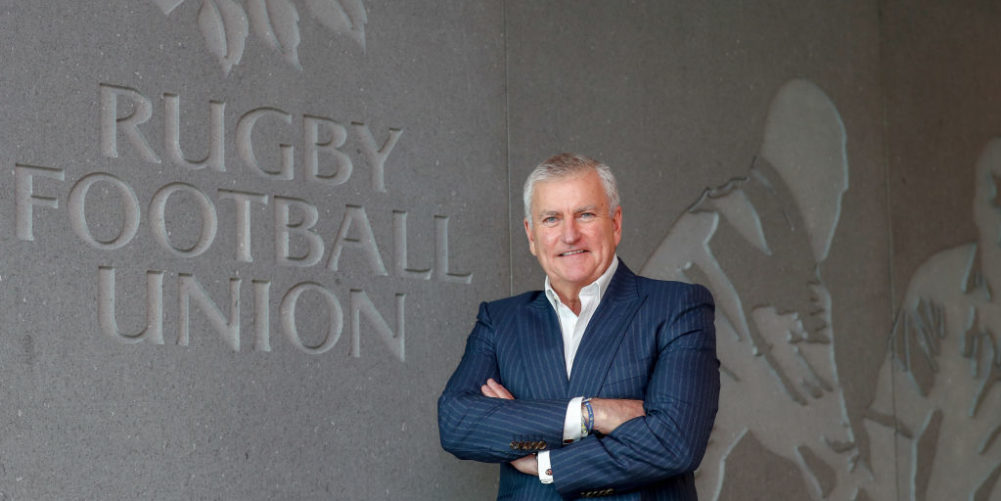EXCLUSIVE
A £50 million bombshell looks destined to sink the current RFU administration headed by chief executive Bill Sweeney and Board chairman Tom Ilube, and threatens to leave the RFU in dire financial straits.
The shockwaves from a quarterly financial report presented to the RFU Council last Friday have reverberated around Twickenham following the disclosure that the RFU, not long ago touted as the richest union in the world, is in mounting fiscal peril.
The Rugby Paper can reveal exclusively that the report, compiled by RFU chief financial officer, Sue Day, has forecast a massive loss of over £40m in the 2023-24 financial year. It also currently predicts a loss of almost £7m for 2022-23, although it will probably be in excess of £10m because the RFU will have to pay around £5m to the Compass Group for its 45 per cent corporate hospitality shareholding at Twickenham.
Day had flagged in the last RFU two annual reports in 2021 and 2022 that the RFU faces difficult financial challenges.
These have increased following a Sweeney-led negotiation with CVC. Although this netted the RFU a £90.8m one-off payment in 2021 from the private equity company in return for 14.3 per cent of its Six Nations commercial revenue annually, the RFU is now feeling the monetary squeeze of that deal.
In 2021 Day outlined the RFU’s predicament post-Covid, stating the union had made “a very sizeable underlying loss over the last year”. She warned: “It will take a number of years to recover from that loss and for the next few years our cost base will need to remain at current levels while we rebuild our lost reserves, right size our debt, and regain certainty over future revenues.”
Those warnings do not appear to have been heeded by Sweeney and company, with a glaring example highlighted by an unbudgeted £1.4m in severance payments for Eddie Jones and other coaches, including forwards coach Matt Proudfoot, after they were sacked in December.
The scale of the projected RFU losses are unprecedented outside the Covid years. However, former chief executive and CFO Steve Brown, was forced to resign in 2018 after presiding over a £30m loss following a huge overspend on new East Stand corporate facilities rebuild, as well as the impact of the bloated £220m eight-year PGA agreement in 2016 between the RFU and the Premiership clubs.
Brown’s deficit looks as if it will be trumped by £20m by Sweeney, who is also in the process of negotiating a new PGA agreement amid fears that the RFU will be swept towards insolvency if he attempts to renew at a similar figure.
Graeme Cattermole, a former RFU Board chairman and chairman of the RFU Finance Committee, told The Rugby Paper: “I have severe misgivings about the RFU’s financial situation, just as I have for a number of years. I do not feel the chief executive has the financial acumen required, and he has shown he is only interested in the professional game.”
“The financial management of the RFU is in the hands of the 12-man Board. The Council can ask questions, but they don’t approve the budgets, which are all done by the Board – and when governance changes were made the Council lost its authority to hold the Board to account.
“The only control now is in the hands of the member clubs, and you have to hope they will call urgently for an SGM. Overall, it is a very worrying picture – the game is in a desperate situation.”
Another former senior RFU official commented: “If you are a chief executive of any organisation and you announce a loss of £40m then you are gone. I am extremely worried by the financial situation we are in now.”
These concerns are driven by the almost unprecedented situation of the RFU incurring losses this season despite having seven matches at Twickenham, with four Autumn tests and three in the Six Nations.
This is normally seen as a major RFU money-spinner, bringing in over £55m in revenue and, until now, it has offset the shortfall in income when there are no autumn internationals immediately after a World Cup tournament.
Combine the disadvantage of having only two home matches in a post-World Cup year like 2023-24 with the cut in its Six Nations income, and the RFU faces a budgetary black hole of an estimated revenue of only £136m to set against costs of £178m.
The fall in revenue is alarming because in previous post World Cup years, like 2015-16, it was £43m higher at £179m. Even in Covid-hit 2019-20 revenue was £169m, with the RFU facing a more manageable £10.8m loss – rather than one of four times that amount.
























Wow! Major changes required in personnel and strategy in the sport.
They just seem to find reasons to bloat the expenditure sheet. At the same time, the willingness of people to pay into RU (club subs, tickets, merch, broadcasting etc.) appears on the slide – and the RFU (and other unions and World Rugby) seem intent on ostracizing warm audiences. E.g. How much will the new unpopular tackle-height laws cost directly (consulting, staff costs, marketing etc.) and indirectly (reduced investment/interest from Fred and Jane Bloggs?).
And all that money to sack Eddie & Co.! I was fed up but let him finish those last 11 months!
I am sure the bible warns about selling one’s birthright for a mess of pottage.
Now £90m is a lot of stew, but it comes at a cost -reduced income for ever more.
The problem is the only control left is to get 100 clubs to call for a SGM. And that is an almost impossible task.